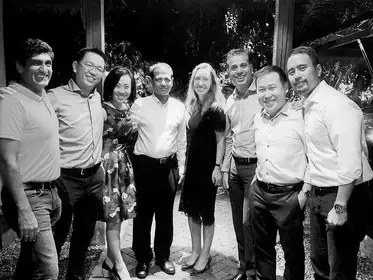Executive Summary
- Tackle self-imposed barriers: Identify self-limiting attitudes and behaviours and address them by pursuing challenging opportunities that help overcome them.
- Nurture cultural assets: Elevate the attitudes and cultural nuances that enhance leadership skills and the ability to connect with the market.
- Gain international exposure: Seize every opportunity to gain experience abroad, which invariably brings cultural hang-ups into focus.
- Be resourceful: The ability to adjust strategy quickly in volatile markets requires being resourceful and drawing on experience managing scarcity.
- Deconstruct ingrained cultural obstacles: Acknowledge the historical context that frames cultural relationships and ingrained notions and expunge the debilitating remnants.
- Adapt: Developing a successful leadership style in a Western multinational will require adopting and adapting certain traits and nurturing others to find the right balance.
Unilever Singapore General Manager Banjo Castillo is a native of The Philippines who recognised the cultural nuances that proved challenging to upward mobility within a large Western MNC and addressed them by pushing himself to gain international experience and adjust, where necessary, to develop a functional leadership style of his own.
Asian markets will, in aggregate, contribute the largest share of global GDP by 2030, with some of the fastest growing countries represented in Southeast Asia. Many MNCs have made these surging Asian economies a central focus of their strategy over the past decade as growth in more developed nations plateaued. MNCs have rightfully recognised the importance of elevating more Asians to senior management to craft regional strategy, but these posts continue to be occupied in large measure by expats from the US and the EU, with only a small percentage being filled by local executives. Many blame cultural hindrances like deference to authority, an unwillingness to challenge the status quo and an aversion to self-promotion that run counter to the directness and aggressiveness associated with corporate leadership in Western culture.
An extensive study by the Center for Creative Leadership (CCL) has explored the underlying reasons for this apparent “bamboo ceiling“ in large global MNCs: in US-headquartered companies, only 8% of top managers were born in Asia, half of those of Indian origin; among companies based in the EU, local leadership represents a mere 2%, with Indian nationals representing the vast majority. While the reasons for this phenomenon are varied and complex, cultural hardwiring has been identified by the CCL as one of the factors.
To counter these perceptions, Asians must learn to adapt their leadership style. At the same time, global leadership needs to be redefined and Western organisations must recognise the richness and diversity that Asians can contribute.
Banjo Castillo, Unilever Singapore General Manager
Banjo Castillo has held various global, regional and national positions and worked as an executive leader in multiple geographies, including North and South Asia, Africa, the Middle East and Russia. Well-respected by his colleagues for his sharp strategy and execution skills, his “universal” leadership has been acknowledged by colleagues of several different nationalities. Castillo’s experience suggests the culture of his home country hasn’t been a limitation.
Pushing Back
Castillo described himself as “more direct” than most Filipinos and noted that many North Asians and Southeast Asians back off “when their ideas and positions are challenged”. “Westerners are not being rude when they challenge ideas; they just want to get to the crux of an issue and come up with the best solution. If you keep quiet, people won’t hear your ideas. You do not get to show how good you are,” he reasoned.
Castillo suggested cultural conditioning predisposes Southeast Asians to withdraw from confrontation and debate. “In the Philippines, for instance, if you challenge others in a group, some of your colleagues may playfully kid you about grandstanding,” he said. “This good-natured ribbing might be interpreted as implicit disapproval for daring to be different and threatening group harmony,” he added. The hierarchical culture in many Asian countries does not help. Subordinates are expected to be respectful and a traditional Asian boss thinks that young subordinates “have a lot of rice to eat” before they can stand toe-to-toe with their superior. Contradicting persons in positions of authority is not generally encouraged in North and Southeast Asian cultures.
Inferiority, Timidity and Fatalism
Overcoming the ingrained sense of inferiority shared collectively by people who were colonised by Westerners compounds the effect of a hierarchical culture and can also prove challenging.
“Filipino education is not inferior in any way. Any inferiority an Asian may initially feel quickly evaporates when you get to the global workplace and realise you can excel. The difference really is that sometimes we are not assertive enough because we were raised differently,” Castillo noted.
A lack of assertiveness can impede upward mobility within multinational organisations. Peers of other nationalities might fight for promotions and express their belief that they deserve to be promoted because they are prepared for it and have a good track record. In contrast, some Asians will keep quiet and swallow their disappointment, because someone who does otherwise would, in their native culture, be perceived to be overly aggressive and “thick-faced.” There is also an ingrained sense of fatalism in many Asian cultures that leads many to live under the premise that, “it will be yours if it is your destiny.” That attitude can be an impediment in the context of a multinational corporation where aggressive networking and competing relentlessly are required to get ahead.
Castillo had always aspired to an international post. He had wanted to be a Country General Manager and knew this couldn’t be achieved by staying home. He knew he’d have to sacrifice and be away from loved ones to take on international assignments and credits Unilever for providing such opportunities to himself and Asian talent generally. Castillo handled several different product categories, markets and roles with Unilever and has even performed a global corporate audit, which gave him a strong foundation in operations. Studies have shown that leaders who move up in MNCs are very deliberate and proactive about their career moves. Castillo’s calculated and methodical advancement within Unilever supports this conclusion.
Positive Aspects of Upbringing
The CCL study advises Asian leaders to “believe in yourself” because self-belief goes a long way in large global organisations. Castillo pointed to his family upbringing as the source of his confidence and self-esteem.
“It’s from my mother,“ he said without hesitation. “She never allowed us to not believe in ourselves. If we did something, we had to be the best. You are going to get it from her if you did not try your best. Because of that push, you realize at a young age what you are really good at. At an early age, I knew I had a knack for being a leader. When I was in school I joined and led some of the school organisations like the school paper and the Student Council. Given what my mother instilled in us, it was never in my mind that I couldn’t achieve what I set out to and, I had the passion and will to do.” This drive to excel instilled by his mother gave him successes early in life, which helped build the confidence he needed to take senior roles outside The Philippines, he said.
While Castillo acknowledged that some aspects of Filipino culture might create an impediment to climbing the corporate ladder at a Western multinational, he also noted several positive aspects of his upbringing in the Philippines. “We did not grow up under easy circumstances. Struggle is important in life. If you underwent hardships while growing up, all struggles at work are but minor inconveniences. Struggle builds confidence and develops character. Many Filipino executives are resourceful because we are used to scarce resources,” Castillo said. Such resourcefulness is part of a critical skill set that empowers the best leaders to respond quickly in today’s volatile markets, he said.
Filipinos tend to be optimistic and have a “glass half full” mentality, a useful attitude for leaders occupying a senior post internationally, Castillo said. “We easily adapt to other cultures, quickly make friends and take everything with humour. Many Filipinos are religious and believe that a lot of their success comes from God. That belief makes us humble,” he noted. Humility in a leader is important in today’s workplace, where even leaders need to be learners, Castillo said, adding that he often seeks guidance from his team in new competencies, like digital media measurement.
That is probably why colleagues also comment on his personal qualities. “Banjo is the nicest, smartest and most respectful person I have ever met,” according to Jane Hoban, Castillo’s former boss. His associates and team members have also observed his openness to learn and explore and to seek out the opinion of others.
“I believe that a lot of the success I am blessed by God to have come by has been positively affected by my Filipino upbringing,“ Castillo said. Many Filipinos and other Asians have what it takes to assume higher-level positions in multinational companies, Castillo said. “We just need to break free from self-limiting behaviours.”

Banjo Castillo with his colleagues in the board
Many multinational organisations are beginning to localise leadership talent in Asia. Locals tend to have greater empathy and understanding of their markets, and can accordingly respond more quickly to threats and opportunities, Castillo said.
There is a strong case for empowering more Asian leaders to assume higher strategic posts in both local and global offices of MNCs. Understanding the psyche of Asian leaders can help Western organisations to capitalise on the richness and diversity Asians offer and can help redefine global leadership. On the other hand, as Castillo readily pointed out, Asians must recognise self-limiting behaviours and adapt to compete for senior positions within Global organisations. The fortunes of these multinational corporations and the leaders they empower are sure to grow in tandem as a result.



